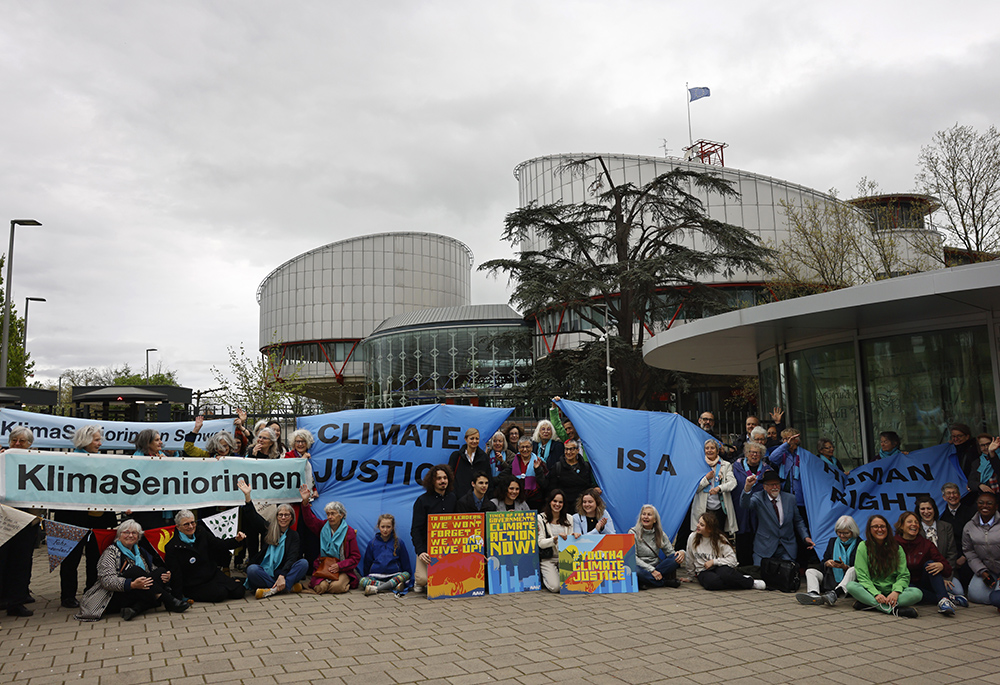
People demonstrate outside the European Court of Human Rights April 9, in Strasbourg, eastern France. The European Court of Human Rights handed down decisions in a trio of cases brought by a French mayor, six Portuguese youngsters and over 2,000 Swiss women who said their governments are not doing enough to combat climate change. (AP photo/Jean-Francois Badias)
Tuesday (April 9), people in Europe received verdicts on landmark climate cases in the European Court of Human Rights. Three separate groups of climate activists sought justice for the storms, wildfires and heat waves that have killed thousands of Europeans. These tragedies were made more likely by climate change.
The court rejected two of the three cases on technicalities. In the final case, it gave victory to climate activists from Switzerland, saying that the country had not done enough to fight climate change, and that by not meeting its targets on greenhouse gas pollution, Switzerland had violated human rights.
It is notable that climate justice was sought in the Court of Human Rights. Just as all of us have the right to life and liberty, so all of us have the right to live on a planet that can support our surviving and thriving.
Just one day before the court's decision, the Vatican's Dicastery for the Doctrine of the Faith published Dignitas Infinita, a new declaration on human dignity. Dealing with a wide range of issues, the document reminds us that every human being "has an inviolable dignity."
The document also urges us to protect the dignity of the "little ones." These are "the vulnerable, the most insignificant, the outcast, the oppressed, the discarded, the poor, the marginalized, the unlearned, the sick, and those who are downtrodden by the powerful." These are precisely the people who are most likely to suffer the effects of the climate crisis, and the people whom we are most called to protect.
Sadly, the human rights and dignity highlighted by this week's court ruling and church declaration are currently denied to millions of people.
In 2022, extreme heat made more likely by climate change swept Europe, where homes were developed for a cooler climate and often lack air conditioning. Approximately 61,000 people died. In 2022, climate change doubled the likelihood of South African floods that killed more than 400 people and forced an estimated 40,000 from their homes.
The perception may be that this problem only affects people overseas. But here in the U.S. last year, extreme heat killed at least 147 people in just five counties in Arizona, Nevada and Texas. Each of these losses is a tragedy. Each person had unique gifts from our creator and is grieved by families, friends and neighbors.
Advertisement
These instances of extreme weather are stark reminders of how a changing climate can take lives quickly. But climate change also hurts people slowly, and the poorest and most vulnerable suffer disproportionately.
When rain patterns change, subsistence farmers can't always invest in irrigation equipment. When powerful hurricanes hit small island nations, families in improvised housing often lose everything. When malaria-carrying mosquitoes arrive in newly warm and wet regions, many impoverished parents can't buy mosquito netting.
Each of the families that is affected by the slow-moving disaster of climate change deserves to dream. The climate crisis takes the possibility of dreams away from them.
While the challenges are immense, God's grace is good. We can choose a new way of life.
We know how to solve the climate crisis. By the end of this decade, we need to ramp up renewable energy production and accelerate innovations in transmission and storage. We need a comprehensive program of job training and support for the people who have worked in the fossil fuel industry over decades past.
Implementing these solutions will require coordination on a scale that governments can provide. No matter which party we support, we know that "national governments are responsible for sending the right signals in order to combat effectively the misuse of the environment," as Pope Benedict XVI reminded us in his 2010 message for the celebration of the World Day of Peace.
In order to protect human dignity, our votes should go to elected officials who are committed to solving the climate crisis. This is essential to implementing solutions in time to protect our brothers and sisters today and our children and grandchildren tomorrow.
Human rights and human dignity demand a climate that is safe and livable for all.





